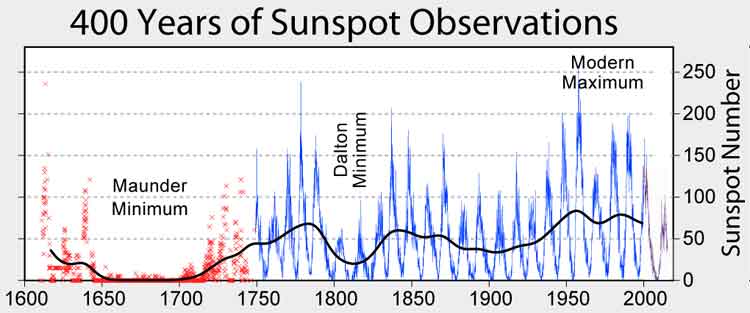The Paris UN Climate Accord and myriad other initiatives are pursued or proposed to reduce CO2 emissions such that, according to best guesses, the world will keep global temperatures from rising more than 2 degrees Celsius from pre-industrialization levels, above which the impact on the planet is likely to be severe, many believe.
But according to some observers, we may wish we had a lot of warming - and in just a few years.
The UK's Daily Star tabloid newspaper said a group of climate scientists powerful, long-term global cycles are likely to start a period of dramatic cooling that will lasts for decades - just as it has done in the past.
"Experts told Daily Star Online that planet Earth is on course for a "Little Age Ice" within the next three years, thanks to a cocktail of climate change and low solar activity," the paper reported.
The paper says research shows that a natural cooling cycle which occurs every 230 years began in 2014 and will send temperatures plummeting even further in just a couple of years.
It also says some scientists are expecting a "huge reduction" in solar activity for 33 years between 2020 and 2053, and that this will cause thermometers to crash - and the the impact will be dramatic and likely far more devastating than that feared from warming. In fact, the paper says during winter, entire major cities - such as London, Paris and New York - could experience to sub-zero temperatures, ice and snow for months, dramatically
changing living conditions and likely resulting in millions of death.
David Dilley, CEO of Global Weather Oscillations, an organization that makes a wide variety of serious predictions about weather, told the Daily Star that global waming and cooling cycles are determined by the gravitational forces of the Earth, moon and sun, with sub-cycles of around 230 years.
He said: "We have had five warming cycles since about 900 AD, each followed by a dramatic cooling cycle."
Dilley noted that the last global warming cycle ended in 1790 and the year 2020 is 230 years following this. So, according to that history, he expects rapid cooling beginning in 2019."
He predicts that the looming cooling period will send temperatures plummeting to lows last seen in the 1940s, when the mercury bottomed out at -21C during winter in the UK.
When the cooling begins in 2019 and continues for the next few years, it will bring world temperatures back to where they were in the 1940s through the 1960s, when it was much colder than recent decades.
And Dilley says not to worry about the polar bears having enough ice.
"The Arctic will freeze solid and rapidly by 2020 and thus allow much more Arctic air to build up and move southward toward Great Britain," he says. "Expect by the mid-to late-2020s that winter temperatures will dip even colder than the 1940s to 1960s.
This big freeze will last for 60 to 100 years, followed by a gradual warm-up toward the next global warming cycle that will not be as warm as the one we are now coming out of now, Dilley adds.
Dilley and others at Global Weather Oscillations are not the first by any means to predict coming cooling not warming.
As the GreenSupplyChain.com reported in 2015, professor Valentina Zharkova of the UK's Northumbria University says research has cracked the code for predicting solar cycles - and that between 2020 and 2030 a pair of solar cycles will in effect cancel each other out, just as opposite radio waves can do, greatly reducing heat from the sun.
The result: a "mini-ice age," caused by something called the Maunder Minimum, when solar flares become increasingly rare. When last seen in the years 1645 to about 1715, it became exceedingly cold, such that London's Thames River froze for one of the relatively few times in history (the last occurrence was in 1814). (See graphic below.)

Predictions from the model suggest that solar activity will fall by 60% during the 2030s, ushering in a decade of cold weather globally. Zharkova claims her models can predict the solar cycle with 97% accuracy, leaving little margin for error.
But not to fear, say others. The Met Office, the UK's governmental weather service, says that a new mini-ice age is a "worst case scenario", and that while temperatures are likely to dip a bit in coming years, it will do little to offset man-made global warming.
Shorts or winter coats? Better have a good supply of each, to hedge your bets.
What is your take on the predictions for global cooling soon? Let us know your thoughts at the Feedback button below.

|